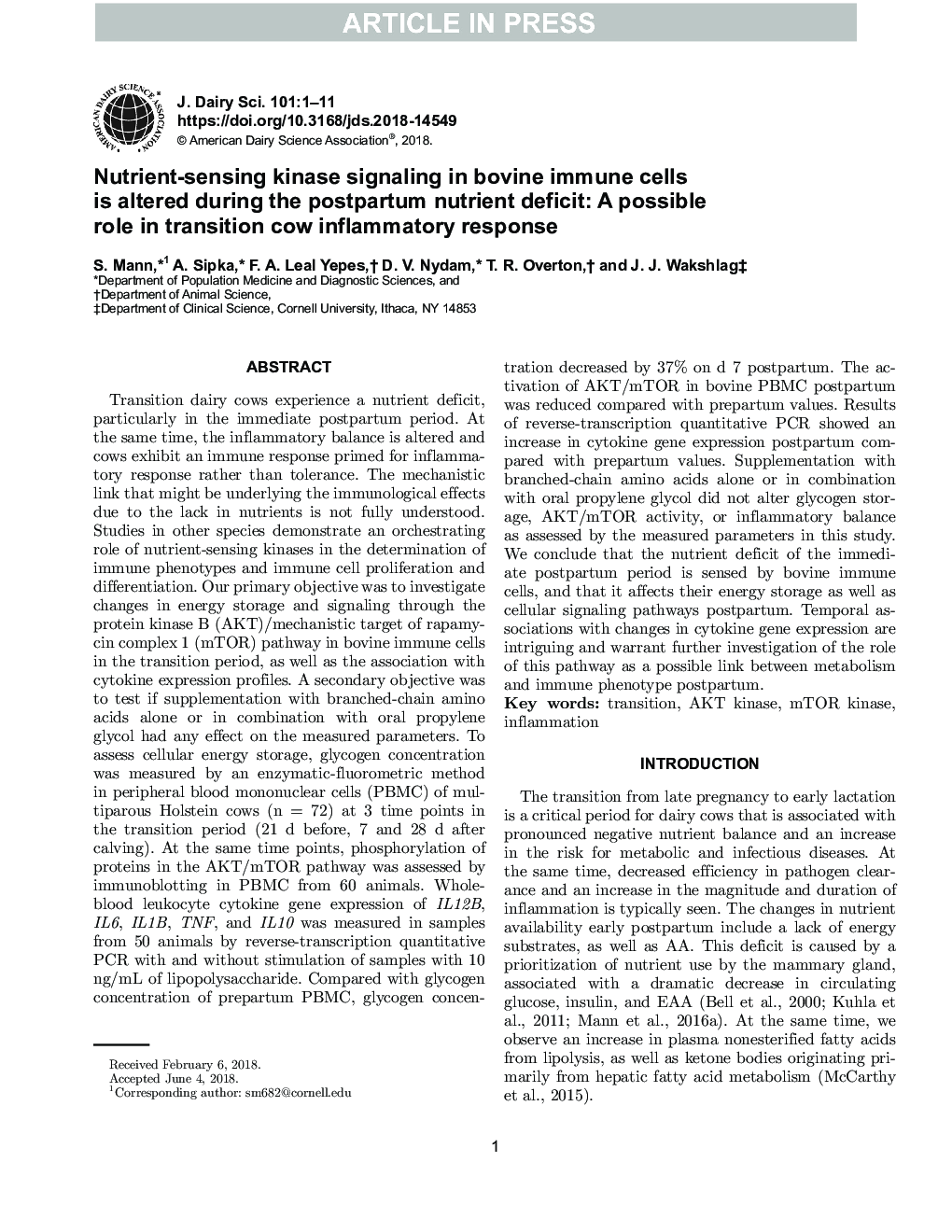| کد مقاله | کد نشریه | سال انتشار | مقاله انگلیسی | نسخه تمام متن |
|---|---|---|---|---|
| 10158095 | 1666505 | 2018 | 11 صفحه PDF | دانلود رایگان |
عنوان انگلیسی مقاله ISI
Nutrient-sensing kinase signaling in bovine immune cells is altered during the postpartum nutrient deficit: A possible role in transition cow inflammatory response
ترجمه فارسی عنوان
سیگنالینگ کیناز سنجش خوراکی در سلول های ایمنی گاو در طول کمبود مواد مغذی بعد از زایمان تغییر می کند: نقش احتمالی در انتقال التهابی گاو
دانلود مقاله + سفارش ترجمه
دانلود مقاله ISI انگلیسی
رایگان برای ایرانیان
موضوعات مرتبط
علوم زیستی و بیوفناوری
علوم کشاورزی و بیولوژیک
علوم دامی و جانورشناسی
چکیده انگلیسی
Transition dairy cows experience a nutrient deficit, particularly in the immediate postpartum period. At the same time, the inflammatory balance is altered and cows exhibit an immune response primed for inflammatory response rather than tolerance. The mechanistic link that might be underlying the immunological effects due to the lack in nutrients is not fully understood. Studies in other species demonstrate an orchestrating role of nutrient-sensing kinases in the determination of immune phenotypes and immune cell proliferation and differentiation. Our primary objective was to investigate changes in energy storage and signaling through the protein kinase B (AKT)/mechanistic target of rapamycin complex 1 (mTOR) pathway in bovine immune cells in the transition period, as well as the association with cytokine expression profiles. A secondary objective was to test if supplementation with branched-chain amino acids alone or in combination with oral propylene glycol had any effect on the measured parameters. To assess cellular energy storage, glycogen concentration was measured by an enzymatic-fluorometric method in peripheral blood mononuclear cells (PBMC) of multiparous Holstein cows (n = 72) at 3 time points in the transition period (21 d before, 7 and 28 d after calving). At the same time points, phosphorylation of proteins in the AKT/mTOR pathway was assessed by immunoblotting in PBMC from 60 animals. Whole-blood leukocyte cytokine gene expression of IL12B, IL6, IL1B, TNF, and IL10 was measured in samples from 50 animals by reverse-transcription quantitative PCR with and without stimulation of samples with 10 ng/mL of lipopolysaccharide. Compared with glycogen concentration of prepartum PBMC, glycogen concentration decreased by 37% on d 7 postpartum. The activation of AKT/mTOR in bovine PBMC postpartum was reduced compared with prepartum values. Results of reverse-transcription quantitative PCR showed an increase in cytokine gene expression postpartum compared with prepartum values. Supplementation with branched-chain amino acids alone or in combination with oral propylene glycol did not alter glycogen storage, AKT/mTOR activity, or inflammatory balance as assessed by the measured parameters in this study. We conclude that the nutrient deficit of the immediate postpartum period is sensed by bovine immune cells, and that it affects their energy storage as well as cellular signaling pathways postpartum. Temporal associations with changes in cytokine gene expression are intriguing and warrant further investigation of the role of this pathway as a possible link between metabolism and immune phenotype postpartum.
ناشر
Database: Elsevier - ScienceDirect (ساینس دایرکت)
Journal: Journal of Dairy Science - Volume 101, Issue 10, October 2018, Pages 9360-9370
Journal: Journal of Dairy Science - Volume 101, Issue 10, October 2018, Pages 9360-9370
نویسندگان
S. Mann, A. Sipka, F.A. Leal Yepes, D.V. Nydam, T.R. Overton, J.J. Wakshlag,
